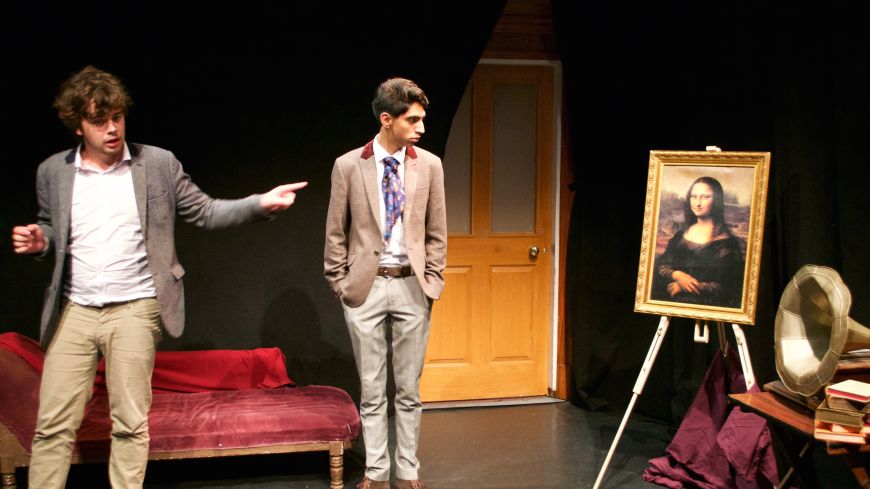
The theft of the most famous painting in the world on August 21st, 1911 created a media sensation. When Leonardo da Vinci’s Mona Lisa vanished from The Louvre, it was thought that Modernist opponents of classical art must be involved; the avant-garde poet Apollinaire and Cubist artist, Picasso became prominent suspects but there was little evidence to support conviction.
Pablo Picasso and Guillaume Apollinaire had been close friends for five years at this time, sharing their appreciation of contemporary art, poetry, philosophy and criticism.
“Paris was the place that suited those of us who were to create twentieth century art and literature." Gertrude Stein
In a perfect “La Boheme” Garret studio space at C Nova, the stage is furnished with a shabby velvet chaise longue, gramophone, books, an old suitcase and bottles of wine. Also in the room, pride of place on an easel is a painting - the Mona Lisa. The problem is that Apollinaire, looking a bit the worse for wear, (perhaps after a few Absinthe cocktails), cannot understand how it is here, in his apartment.
Pablo arrives, (rather snazzily dressed in white shirt, silk cravat, tweed jacket), and he is also confused by the painting. Perhaps it’s one of his own works? If so, his Oeuvre is not in the Louvre.
A discussion on the merits of the portrait then ensues: who was this lady with the enigmatic smile, what does this signify and why does she have no eyebrows. ?
Realising that this must be the invaluable masterpiece by Leonardo de Caprio (sic), they have to decide how to hide it, sell it or return it to the gallery. Preferably with a reward for their good deed.
Will Dalrymple and Yaseen Kader create a madcap double act as the poet and artist, both on stage and in a mini silent movie shown on screen dramatising their adventures with the painting along the banks of the Seine. The police interrogation of Pablo and Guillaume is played out with slapstick, pantomimic fun.
This is an hilarious, LOL, riotous romp of a “one door farce”. Unlike the typical Feydeau or Ayckbourn comedies, the economical set has just one door for all the frantic exits and entrances. (The door knob sometimes sticks too, whether by accident or design, I am not sure, but adds to the silliness of the show.)
A host of characters bound on stage at odd intervals – James Joyce, F. Scott Fitzgerald, Hemingway – the intellectual elite around town. Elliot Wright (a younger version of Stephen Fry), portrays them all with inventive caricature style.
The script is littered with literary allusions from Eliot’s Prufrock to Appollinaire’s bitter hatred of Stein’s poetry, “ If I told him would he like it. Would he like it if I told him.” A battered paperbook of her work is viewed as complete torture.
Just as Woody Allen accomplished in his enchanting movie, “Midnight in Paris,” this comic play is both a celebration and a gentle send up of The Lost Generation of artists and writers inspired by the cultural Parisian soirees and salons.
Expect a bunch of Bohemian characters and a jumble of cultural genres to create a crazy farce performed with energy, wit and intelligence by this talented company: an hour of Pythonesque humour and Inspector Clouseau charm, deconstructed into a surreal, Cubist fantasy all of its own.
Show times
16 – 31 August, 2015 @ 8.50pm
Ticket prices: £8.50-£10.50 (£6.-50-£8.50)

